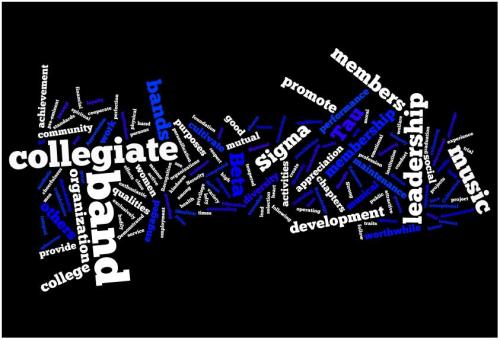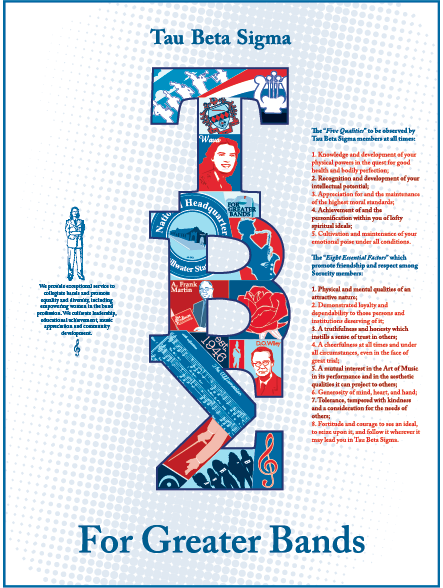

Funky letters!!
It was letter making night for sisterhood week! I made a pretty awesome t-shirt and… crazy cat lady letters with my big!! We’re so goofy, I love it. <3


Funky letters!!
It was letter making night for sisterhood week! I made a pretty awesome t-shirt and… crazy cat lady letters with my big!! We’re so goofy, I love it. <3
Greetings SED,
Just a couple of important announcements:
First, DLC is THIS WEEKEND! It’s free, so if you haven’t gone over to www.kkpsipi.org to register, do it NOW!
At DLC we will be working on a book of cards for Wava. Please bring with you photos, markers, colored pencils, glue, scissors, and again PHOTOS, to put in the cards. Once the book is completed, we will be sending it to her family! Make sure you come prepared to participate as I will not be able to provide enough supplies for everyone!
SEDVPSP Highlights from Shells:
If you have any photos of your chapter that you’d like to be featured on the blog or on the SED website, please send them to me, stating what chapter and a brief description of the photo. Part of the reason why I created the blog was to recognize the chapters that are doing outstanding service, so please be sure to send items in!
The service database has been around for a while, but hasn’t been utilized recently. It contains service projects from chapters all over the district is an opportunity for you all to do that year-round. So I introduce the “2012 Service Database Challenge”. The chapter that submits the most original ideas to the database will win a brick in the “Walk of Fame” leading up to our National Headquarters at Stillwater Station. This is a really great way for your chapter to be recognized and to be a part of National Headquarters. The rules are as follows:
1)All submissions to the database must be submitted via the SED Website: www.kkytbs.org/sed/tbs/index.html
– Click on “Programs” at the top of the page
– To submit, click “Contribute to database” and fill out the form
– To view the current database, click “Current Projects Database”
– All submissions are automatically sent to my email
– DO NOT SEND DIRECTLY TO MY EMAIL OR IT WILL NOT COUNT!
2) DO NOT send the same project/idea more than once. It will not count more than once.
3) The chapter with the MOST submissions will win
4) It DOES NOT matter when the project was completed
5) The DEADLINE for all submissions for the challenge are due by midnight, Wednesday March 14th.
In other news, as decided at the 2011 National Convention, the new deadline for several scholarships and awards is MARCH 1st! You can view all of those by visiting www.tbsigma.org. Feel free to email your National Vice President for Communication and Recognition, Jonathan Markowski – jonathanmarkowski@tbsimga.org, for more information.
(Sorry for all those abbreviations in the title!!)
Composer and pianist Eubie Bl ake referred to James Resse Europe as the “Dr. Martin Luther King, Jr. of music”. Mr. Europe was born in Mobile, Alabama in 1881 but was raised in Washington DC where he learned to play violin and piano. He moved to New York City in 1904 and became a professional pianist. While in NYC , he networked with many professionals in the black musical theatre industry. Eventually one of his songs appeared in the 1906 productions of Shoe-Fly Regiment.
ake referred to James Resse Europe as the “Dr. Martin Luther King, Jr. of music”. Mr. Europe was born in Mobile, Alabama in 1881 but was raised in Washington DC where he learned to play violin and piano. He moved to New York City in 1904 and became a professional pianist. While in NYC , he networked with many professionals in the black musical theatre industry. Eventually one of his songs appeared in the 1906 productions of Shoe-Fly Regiment.
Mr. Europe formed the Clef Club in 1910, an organization serving as a union and talent agency for black musicians, and eventually a Harlem concert hall. He served as its president and even formed an orchestra and chorus, which performed “A Concert of Negro Music” at Carnegie Hall in 1912, a performance that had a huge impact on the history of jazz. It is to be noted, however, that the band was not a jazz band, but a symphonic band. “The 125-man orchestra included a large contingent of banjos and mandolins and presented music by exclusively black composers. By this time, Europe believed that although black musicians respected white music of quality, they did not need to play or imitate it. Instead they had their own music to play which people of all races would want to hear.”
After leaving the Clef Club in 1913, Mr. Europe went on to form the Tempo Club, an organization very similar to its predecessor. A year later he worked with dancers Vernon and Irene Castle, inventing dances like the turkey-trot and fox-trot. In 1914 he began recording a unique style of music, unlike the jazz and ragtime that were popular during the era.
Mr. Europe enlisted during World War I where he put together a band of great musicians and they became the 369th Regiment, or the Hell Fighters. The band travelled all over Europe, garnering praise from the many natives. In 1919, the United States welcomed as a hero. He began a tour with the Hell Fighters across the country, starting in New York City. However, before the next show in Boston, Mr. Europe was killed by one of his percussionists after a disagreement. Mr. Europe was known for his booming personality and for being the most popular black bandleader of the early 1900s.
sources: Library of Congress, Oxford African American Studies Center
better than any commercial i saw tonight
I decided to do this blog series as a way to recognize prominent (and some not so prominent) Black historical figures in music as a way to celebrate this year’s Black History Month. Each week I plan to feature a different individual and his or her contributions to music. I hope that you find these blogs entertaining and educational and that you share them with you candidates, bandmates, and/or campus communities. I encourage your chapters to recognize other Black historical figures in music and shine light on their achievements not just this month, but year round, either by hosting a seminar or guest speaker, doing a showcase, or other creative means at your schools.
This week I am featuring Henry Lewis, conductor (1932-1996)

Henry Lewis, born October 16, 1932 in Los Angeles, California, is credited as the first African American to conduct and American symphony orchestra. Lewis learned to play the piano as a young child, later moving onto clarinet, and many other instruments. At just 16 years old he became the first black instrumentalist in a major symphony orchestra, playing the double bass in the Los Angeles Philharmonic.
In 1951, Mr. Lewis began attending theUniversity ofSouthern California on scholarship. In 1954, he was drafted into the Army where he played with and conducted the Seventh Army Symphony (inGermany and theNetherlands) for two years. Upon his return to theUS, Mr. Lewis continued to perform with the Los Angeles Philharmonic. From 1961-1965 he served as the assistant conductor of the ensemble. During his time inLos Angeles, he also formed the Los Angeles Chamber Orchestra.
In 1968, Mr. Lewis was selected as the music director and conductor of the New Jersey Symphony Orchestra. He spent 8 years with the ensemble, transforming it from a small community group to a prestigious first-class orchestra, taking the stage at Carnegie Hall, theKennedyCenter, and other esteemed venues. The orchestra played a big roll inNew Jersey community outreach, performing at high schools and various community events in the area, as well as performed with the likes of renowned pianist Misha Dichter and violinist Itzhak Perlman.
Mr. Lewis became the first African-American to conduct at the New York Metropolitan Opera in his 40th birthday in 1972. He retired from the New Jersey Symphony in 1976. He continued as the chief conductor of the Radio Symphony Orchestra as well as guest conducting many major orchestras all over the world until his death in 1996.
I encourage you to read more about his accomplishments and his struggles as a black man in classical music here: New York Times
Sources: NY Times (1996), LA Times (1996), Praise Indy (2001), Astro
“Recognition and development of your intellectual potential”
The second Quality to be observed by Tau Beta Sigma Members is a relatively simple yet deep statement. Part of the reason Tau Beta Sigma was formed was to foster intellectual, spiritual, and personal growth through our time in college and to provide us with the tools to continue or development in these areas for the remainder of our lives.
Let’s start with recognition. I wouldn’t consider myself to be arrogant…most of the time…but I know that I am intelligent and bright. I know that I enjoy learning and have the ability to pick up certain skills easily and quickly. However, recognizing your intellectual potential is more than just knowing that you’re intelligent. To me, it means not placing boundaries on your mind and believing in your capabilities. Learning is a process that we’ll continue for the rest of our lives. We will continue to be exposed to the unknown until the day we die. ”Recognition…of your intellectual potential” is understanding that, as they say, the world is yours for the taking.
To develop your intellectual potential is to go once step further. Knowing that you are capable of seizing opportunity, but then letting it pass you by is worse than not having the opportunity at all. Take the time to allow yourself to grow. Walk through doors that may have been closed for you once before. Explore the unknown. Add new experiences to your library of knowledge. Recognizing and developing your intellectual potential will allow your mind to expand, creating opportunities unseen to you before. If you seize these opportunities and feed your mind as set forth by the teachings of Tau Beta Sigma, you will be led to a life of insatiable fulfillment**
**insatiable fulfillment – phrase that I made up that I’m not sure makes sense. definition: being fulfilled by all that you have achieved in life, yet forever maintaining a desire to seek more knowledge and opportunity.
_______________________________________________________________________
In other news, my past post for this series was about good health and bodily perfection. Well, I am pleased to say that I have lost around 15lbs and I am still going. I feel healthier and I have more energy! I encourage everyone to strive to be the best versions of themselves physically and mentally! 😀

Food for thought.

This is such an awesome poster! I’m definitely printing one out for our house… since 3/4 of us are sisters.